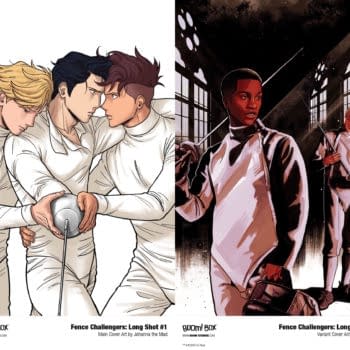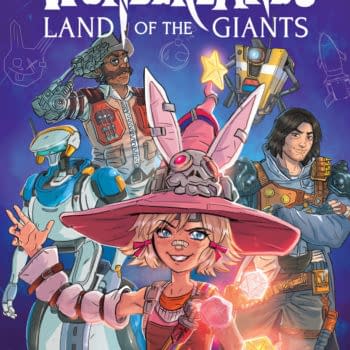Posted in: Comics, Recent Updates | Tagged: Comics, industry, lee barnett
So It's 'Who You Know'. So What? – Lee Barnett Is The Adult In The Room
Lee Barnett writes for Bleeding Cool;
"When it comes down to it, it's about who you know, and who's a fan. It's about whether you're the right age, whether you're hot or not, whether the studio is into you or not." – Marlee Matlin

It got me thinking about access to people and, since this is supposed to be about comics, getting access to editors, and to paying work.
Anyone in any field that involves purchasing third party goods or services will recognise the following scenario: you're sitting in your office and you get a call or an email from someone you've never heard of, offering their services. It doesn't matter whether they're trying to sell you photocopiers, insurance, recruitment services, or a script, if you have the authority to buy from them, they'll contact you; they always do.
They'll plug themselves, tell you who else they've worked for (quoting names of respected folks you've heard of) and then offer to send you information, examples and the like, and they'd like to come in and meet you if they're local.
I'm not kidding; in my last day job as Financial Director of a company, I was festooned with such 'offers', everything from – as stated above – photocopiers, recruitment, stationery supplies, lease reviews, to new products for the company, even though for the latter, we had an entirely separate acquisitions department.
With almost all of them, there was a standard reply, something along the lines of "Thanks for the interest, but we have our own suppliers. Yes, if they let us down, we'd contact our contemporaries to find out who they're using. Thanks, but don't sending examples; if I said yes to you, I'd have to say yes to everyone, and my desk would collapse under the weight of brochures, and my inbox would explode."
I wrote above "almost all". Yeah, some got through… the people who could give me the name of someone I knew from whom I could get a personal recommendation.
What's that you ask? Is it always "it's who you know"?
Yes. Yes, yes, a thousand times yes.
Who you know gets you in the room. Sorry, but it's true.
Not for nothing did a major comic book publisher thirty years ago, in response to the question "what's the best way of breaking in to comics?", answer "Move to New York."
Now, three decades later, with email and Twitter and international conventions, "who you know" can include everything from regularly going out for a drink with a friend, to chats at a con, to participating in a series of pun laden Twitter hashtag events. But the crucial point is they recognise your name, and the face; who you are and what your ambitions are.
Who you know gets you in the room.
Was true then. It's true now.
Notice I say nothing – nothing – about who you know being what gets you work.
It doesn't.

What you do once you're in the room, what your pitch is, how good your work is… that's what keeps you in the room. That's what gets you work.
And it's true whether you're selling photocopiers or comics scripts or your skill as a penciller.
Sure, some folks land work after a portfolio review at a con. It's happened, many times. And every single person who later submitted work after such a review started off their submission with "We met at the such-and-such comic con", reminding the editor that they'd met, that they weren't a stranger… that the editor knows them.
Commissioning editors maintain a polite fiction, aided and abetted by many creators, that "talent will out", that if you're good enough, you'll always find a way.
That's crap.
Talent won't always find a way to be noticed. For a start, if it did, there'd never be any examples of an "overnight success that took twenty years", because that talent would have been noticed long previously. Some might argue that such successes are the vey exemplar of "talent will out", but they're wrong; such people ignore the huge parts that determination, stamina, a thick skin, a separate income and luck all play in the endeavour.
Despite the oft-quoted definition of luck as "when preparation meets opportunity", yes, pure, blind luck does sometimes play a part in getting you in that room.
But "who you know" plays a far bigger part.
Is it a bad thing? Not entirely, and not always; personal references may be a huge benefit for the person being recommended, but they carry an entirely understood and implicit obligation: that the person passing on the recommendation doesn't send you someone incompetent, friend/contact or not.

What's so different about recommending a writer or a penciller? After all, editors have their own deadlines and someone reliable, who's fast, who comes with recommendations as to their professionalism will always be wanted.
References and recommendations are how the world works – in business and socially, whether it's being suggested for a job, or for a blind date.
As Robert Whipple wrote:
"You cannot have exactly the same feelings about different individuals. On some level, you are going to like being with or working with one person more than another. To deny any favoritism within you for other people is to deny your humanity."
In business, however, yes, of course there's a problem if the recommendee ain't up to the job. They blow deadlines, or are discourteous in their outlook, attitude or work.
Fair enough, you don't hire them again, and you view further recommendations from their referee with suspicion.
But providing references to others is how every industry works; the process relies upon competence and honesty from those both giving and those benefitting from the references.
Comic books are wonderful things to read, to savour, to enjoy. But the business behind them is like every other: run by people with their own preferences.
We can only hope the preferences are for superlative work, professionalism and the ability to tell a great story.
Lee Barnett is a writer. He's written comic books, radio comedy for the BBC and two collections of short stories under the title THE FAST FICTION CHALLENGE. He's also a contributor to elephantwords. Known in the UK Comics industry for the annual hypotheticals panel he devised and presented with Dave Gibbons at the UK Comics Festival, some people call him "budgie".











